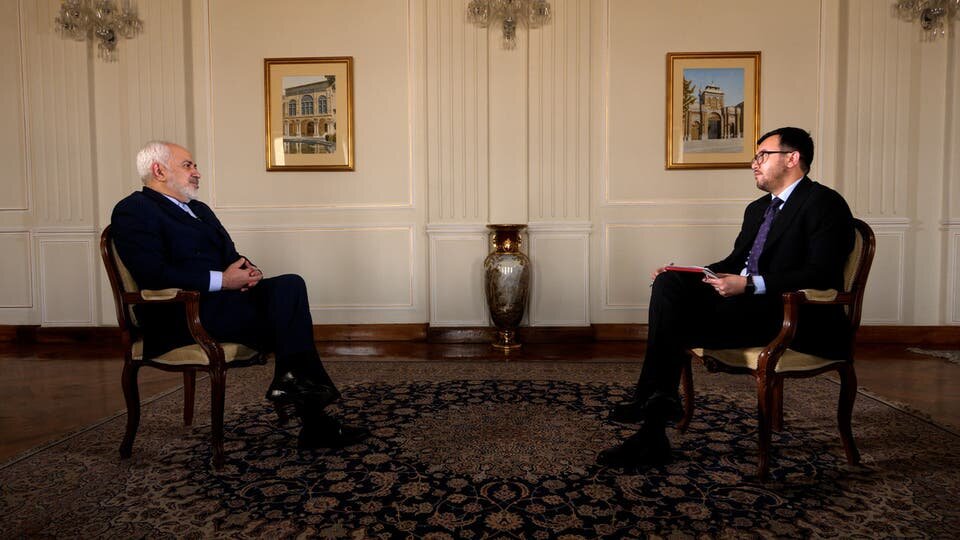Taliban is part of future solution in Afghanistan, says Zarif
FM says Iran has neither “forgiven” nor “forgotten” the murder of Iranian diplomats by Taliban

TEHRAN — Foreign Minister Mohammad Javad Zarif has said the Taliban is part of a future solution in Afghanistan, but not the whole solution, and there is a big difference between the two.
In an interview with TOLOnews aired on Monday, Zarif said “the Taliban has committed many terrorist acts,” and “we have not removed the Taliban [from our list of] terrorist groups in our laws.”
“We follow exactly what is decided by the UN Security Council,” Zarif reiterated, “but we do believe that the Taliban is a reality in the future.”
He also said the U.S. should be a facilitator of the peace process in Afghanistan but should not simply make deals with the Taliban.
“We want a lawful and calculated withdrawal of foreign troops from Afghanistan that should be based on the demands of the Afghan people and it should be a responsible security transition to the Afghan forces. We do not want it in the current form, where the Americans go and negotiate with the Taliban,” Zarif said.
“We see Afghanistan as an independent country that has made many achievements in the areas of democracy, human rights, women’s rights, and the rights of minorities over the past 19 years, since the Bonn conference in 2001.”
The foreign minister said Iran sees the U.S. presence, whether it is in Iraq, Afghanistan, or in any other country in the region, as a force that disrupts the peace and security in the region, but he added that Iran is not making decisions on behalf of the governments of these countries.
He said Iran did not contribute to the U.S. presence in Afghanistan in 2001 but instead contributed to establishing an independent and democratic government in Afghanistan.
Zarif reiterated that Iran’s policy toward Afghanistan has never changed and it has always been to support the Afghan government and the Afghan people.
In response to a question about whether the U.S. presence helped Iran’s national security, Zarif said he does not think so.
“The foreign [military] presence sparks some internal [national] feelings in every country that the radicals and extremists exploit to serve their terroristic purposes,” Zarif mentioned.
He mentioned the Bonn Conference, Tokyo Conference, and the recent inauguration of the Khaf-Herat railway line as examples of Iran’s cooperation with Afghanistan.
Zarif said that Iran has its own stance regarding the Afghan peace process.
“We do not exactly know what the U.S. position about Afghanistan is. If it is what is reflected in their talks with the Taliban and in their agreement with the Taliban, we certainly oppose it. We see that as a dangerous act. It is not in the interest of the Afghan people. It is just an internal decision [of internal value] to justify the U.S. withdrawal,” Zarif said.
Zarif says U.S. has ‘shifted sides’ in Afghanistan
The Iranian foreign minister said the U.S. has “shifted sides,” referring to the U.S.-Taliban agreement that sidelined the Afghan government but said Iran has never sat down with the group to decide the future of Afghanistan.
“We will surely work with the Taliban. But we will not sit with them to decide about the future of Afghanistan and sign an agreement,” Zarif said.
Regarding the death of Iranian diplomats by the Taliban, Zarif said: “We have neither forgiven nor have we forgotten.”
He also refuted claims that Iran supplies arms to the Taliban and treat the wounded Taliban. However, Zarif said, Iran has “serious talks” with the group.
“I personally met Mullah Baradar in Tehran, just as officials from other countries met the Taliban delegation either in Doha or in their respective capitals,” he said.
He said Iran has taken the Afghan government on board when it had exchanges with the Taliban, saying: “We shared demands raised by the Afghan government with the Taliban.”
He said that Iran is not a mediator in the Afghan talks but it is a neighbor, and Afghanistan's future is significant for Iran.
“Afghanistan’s future is important, and we want its future to be as I explained to you,” he said.
Asked about whether the Taliban leaders have houses in Iran--in Mashhad and Zahedan--Zarif said he does not know. “Some people, who have relations with the Taliban, might move back and forth to Iran. But they certainly do not run any headquarters or bases in Iran,” he added.
He said that in their statement on the start of the peace negotiations in Doha they supported the process but protested U.S. management. “I said, we do not accept the U.S. policy in this regard.”
“Trump sacrificed Afghanistan for the sake of his election campaign”
He said the attendance of Mike Pompeo at the opening ceremony of the Afghan peace talks in Doha turned the event into an election campaign for President Trump and that “Trump sacrificed Afghanistan for the sake of his election campaign, and we will realize the very great harm he inflicted on Afghanistan in the future.”
Regarding the Taliban’s stance on Jafari jurisprudence, Zarif said the issue is concerning, but added that “Afghanistan’s constitution recognizes all Islamic jurisprudences as official. If the Taliban treats Afghanistan’s Shias as a minority group, like Christians or followers of Buddhism, it is in contradiction to Islamic values, based on the beliefs of all believers who believe in an Islamic government.”
On resuming nuclear talks, Zarif said, “Iran does not need negotiations. You fulfill your commitments, we fulfill ours. We have clearly explained our stance.”
MH/PA
Leave a Comment